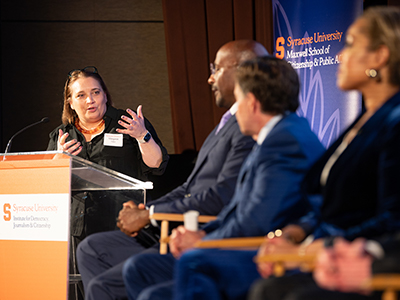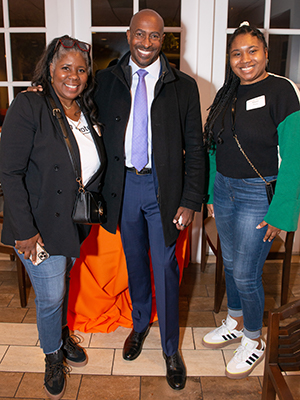
All Star Broadcasting Panel Addresses the ‘Intersection of Entertainment and Democracy’
April 14, 2023
Award winning broadcasters Van Jones and Bob Costas were among those who took part in a recent Los Angeles event celebrating the launch of the Institute for Democracy, Journalism and Citizenship.
While covering the Olympics’ opening ceremony for NBC in 2012, journalist Bob Costas H’15 noted a tragic anniversary: During the 1972 Olympics in Munich, a Palestinian militant organization killed 11 Israeli athletes and coaches.
The International Olympic Committee (IOC) had declined a request to hold a moment of silence during the 2012 events to remember the late Israelis. As the athletes marched in, Costas told viewers that IOC President Jacques Rogge had led a moment of silence earlier in the week, before an audience of about 100 people at the Athlete's Village.
"Still, for many, tonight with the world watching is the true time and place to remember those who were lost and how and why they died," Costas said. After a brief pause, NBC cut to a commercial.

Costas shared the anecdote during a recent panel discussion held at Warner Brothers Studios in Burbank, California, celebrating the launch of the Syracuse University Institute for Democracy, Journalism and Citizenship. Costas, who attended the S.I. Newhouse School of Public Communications before launching his storied career and was awarded an honorary degree in 2015, was among the special guests who took part in the discussion, titled, “The Intersection of Entertainment and Democracy: Are We the Problem or the Solution?”
The event was held in the Los Angeles area, where the University boasts a thriving alumni population and academic programming, including Newhouse LA. While it will be based roughly 2,700 miles away—in Washington, D.C.—the institute will address issues of pressing national relevance such as threats to the media and democracy, and the fight against disinformation. Announced in the summer of 2022, it is a partnership of Newhouse and the Maxwell School of Citizenship and Public Affairs.
“With the launch of the new institute and with the combined strength of Maxwell and the Newhouse schools, the University will play a vital role in leading dialogs that bring people together, helping to bridge the differences and divide seen and experienced in our country today,” Newhouse Dean Mark J. Lodato told the panel audience of mostly alumni and friends of the University. “And while the institute will be based in Washington, D.C., I hope you can see that its work and impact will have a national, broad reach involving faculty and students and research and teaching, convenings like this and experiential learning opportunities.”
In addition to Costas, panelists included another alum—Danielle Nottingham ’99, co-host of NBC’s “California Live;” CNN correspondent David Culver; and, from the University, Lodato, Margaret Talev and David M. Van Slyke. Talev is the institute’s recently named Kramer Director, while Van Slyke is dean of the Maxwell School.
Author, lawyer and CNN host Van Jones provided opening remarks focused on the virtues of listening, engaging others who have different perspectives and finding common ground.
The conversation explored the topics that give rise to the need for the institute—political polarization, mistrust in institutions including the media, and the role of entertainment news, disinformation and higher education.

Costas, who has been honored with 28 Emmy Awards, called 12 Olympics and covered multiple World Series, Super Bowls and NBA finals, explored the intersection of sports reporting and current events. In addition to his experience with the 2012 Olympics, he shared more recent occasions when he has taken time during his sports broadcasts to discuss current events and what some might view as thorny issues.
For instance, during a playoff game this past fall, he spent nearly a minute talking about the rationale behind the Cleveland Guardians’ name change from the Indians. And, during Sunday Night Football, Costas has spoken about the prevalence of brain trauma to athletes.
Of the latter, he said, “When I used that two minutes a handful of times to talk about the fact that football is as directly connected to brain trauma as smoking is to lung cancer, that got me on the wrong side of a lot of people: The NFL, my own network, and people that just don't want to hear it because they love football, you know?”
Costas said that while people turn to sports for entertainment—“to get away”—it can also be “the best place to make a good point to the largest possible audience if you do it concisely and at the right time.”
Talev, a veteran journalist who served as managing editor for politics at Axios and was a CNN political analyst before joining the University this past summer, talked about the erosion of trust in institutions such as the military, the Supreme Court and higher education. Adding to that, she said, “Technology is giving us more opportunities to choose your own adventure and tune out the stuff you don't want to hear.”
She asked Van Slyke to reflect on how that has impacted teaching at the University.
Van Slyke described a game he plays with students at the start of a semester: He asks them at first what they read in the morning—a question that often draws “furrowed brows” since most admittedly are reading their cell phones. Then he asks innocuous questions such as, how many are first-generation students, how many are from military families, how many are Yankees fans.
“When you go through this a little bit, all of a sudden you start to see people looking at one another, because what you've taken away is party identification,” he said. In the absence of that, it’s easier to find common ground, to have discourse.
Van Slyke shared that he and colleagues are challenged by the notion of evidence, given the current polarized climate in which people cite the sources that share in their beliefs, often at the expense of factual, credible information.
“We've lost any confidence in what evidence actually means,” he said, adding that he challenges students to consider things such as: “What are the facts? How did you collect the facts? Where did the facts come from? What did the data look like?”

During the hour-long conversation, panelists also talked about how to reach Gen Z—those born from the mid-1990s to the early 2010s. Nottingham shared how she felt compelled to join social media channels like Instagram, where she didn’t at first feel comfortable, to better connect with the demographic.
“I think that when we talk about dialog and how we move forward, and all these things, we have to look to the younger generations,” said Nottingham, a graduate of the College of Visual and Performing Arts. “They don't see the world the way we see the world.”
Van Slyke later told Nottingham that while she may have joined with some trepidation, “the good news is other people are going to find you and they're going to tag that with some legitimacy.”
He added that New York Governor Kathy Hochul—a Maxwell alumna—recently shared a $1 billion plan to overhaul the state's continuum of mental health care. He said he was pleased to see students take to Instagram on the issue, some sharing 40-year-old stories about the former network of institutions where the mentally ill were housed and often mistreated.
“The process is very different” for them getting the information, he added.
As the event came to a close, Costas noted the contrast in how NBC supported fellow Syracuse alumnus Mike Tirico ’88 to cover the 2022 Olympics, a decade after him. Tirico—a graduate of the Maxwell School and the College of Arts and Sciences as well as Newhouse—infused his reports with well-researched background and guest experts who spoke about the intense global scrutiny to the host country, largely for the mistreatment of ethnic minorities.
“You know, they laid it out. …They did something credibly,” he said. “They did it at the beginning. And then they got out of the way for the most part and let the competition play out. They did a very journalistically responsible thing.”
By Jessica Youngman
Published in the Spring 2023 issue of the Maxwell Perspective
Related News
School News

Dec 19, 2024
Commentary

Dec 18, 2024
School News

Dec 16, 2024
